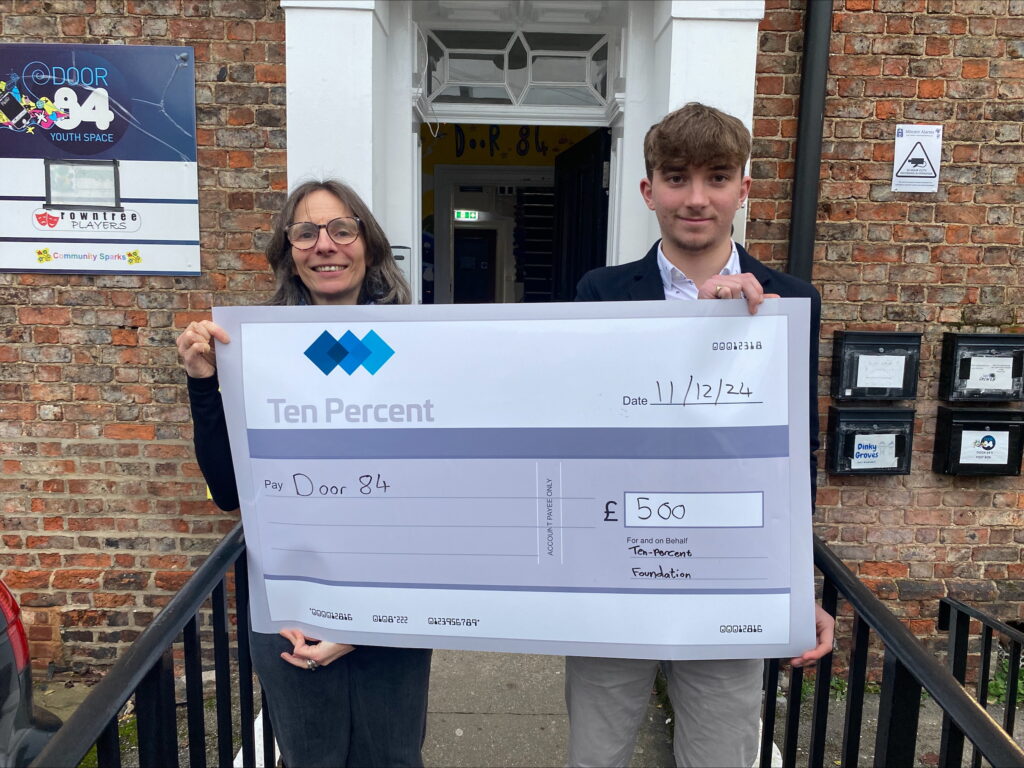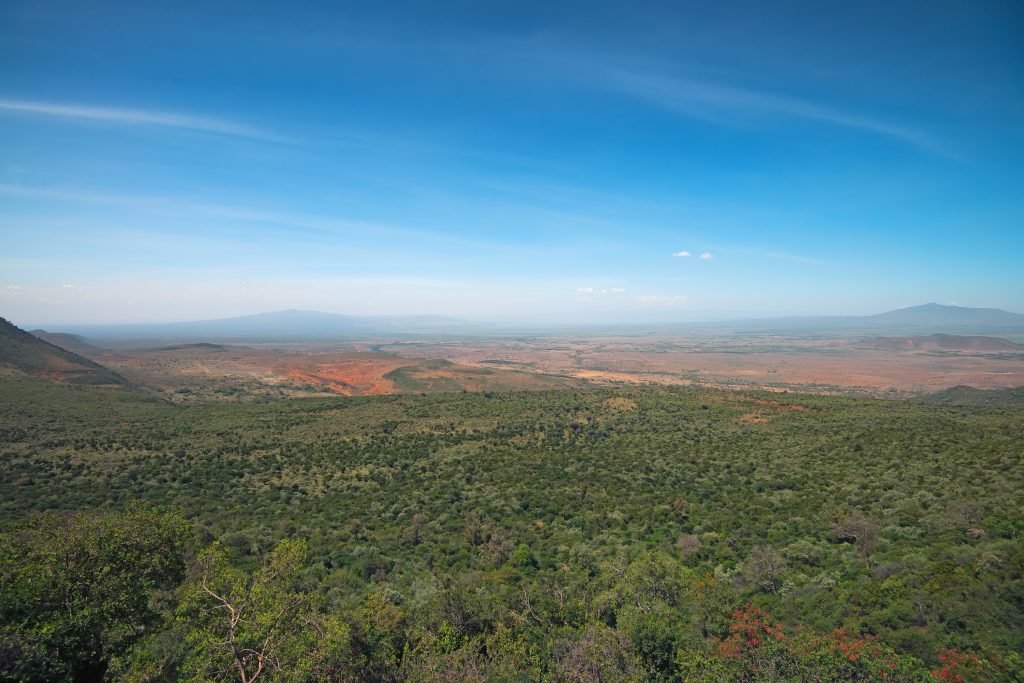In December 2024 Toby Hirst, an administrator with the Ten Percent Group, went to visit Door 84. We should add that whenever we undertake these trips, the costs are funded by our company (Ten-Percent.co.uk Limited) and not the Ten Percent Foundation (in case anyone was wondering!).
Just keep helping us to do what we’re doing. We love what we’re doing here, it’s working, it’s working well, but we need people to support us to keep it going. And we know there are people out there that want to keep organisations like ours supported and up and running and making a change and making a difference in communities. So that’s our angle. Just please keep helping us because we need you.


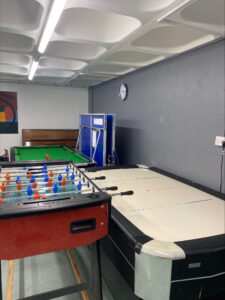

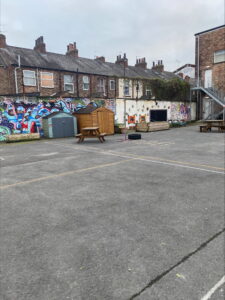
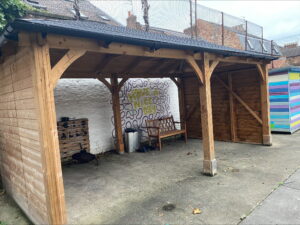
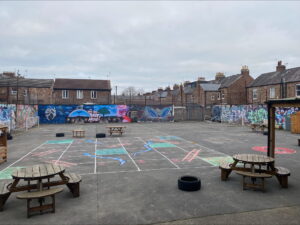
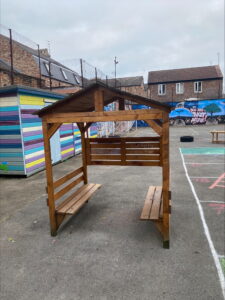
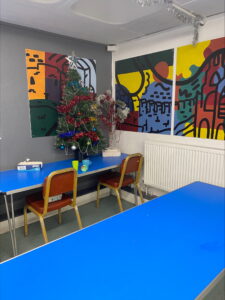
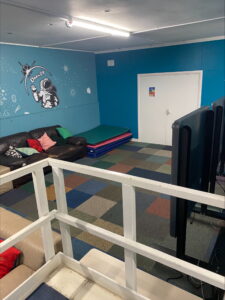
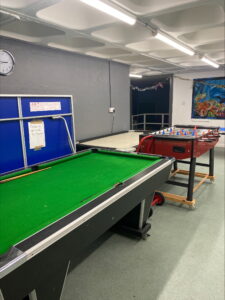
Toby had a chat with Carole Pugh, one of the trustees, and Lisa Green the Executive Charity Manager.
Door 84 as an organisation has been around known as Door 84 here at this address since the sixties. The charity, it wasn’t known as Door 84 in the various guise.
Toby Hirst:
So it’s quite an old charity.
Lisa Green:
The Charity itself is actually dates back to 1939. And it was in another part of the city. And so originally it was known as York Boys Club, and then it became York Boys and Girls Club. And then it was changed around 15, 16 years ago to 84, just describing our address. So the young people decided to call it Door 84 because it was the open door that they could come in and find their space and their activities and the social time with their friends. And since then, it’s kind of grown from being boys focused initially to young people focused to youth and community focused. So we now do community sort of not till whenever we’ve got services within then difficulties. And we’ve got specific youth provision as well. It’s eight to 16.
Carole Pugh:
I’ve been a youth worker in the Mount York for 26 or so years. So I have worked in different capacities before that. I now teach at York St. John, which is five minutes walk in that direction. But I used to teach on a community work degree, so I had a lot of students that came here on placement. I’ve been a trustee over an organisation for about 15 years.
Toby Hirst:
And are you registered with a charity commission as a charity?
Lisa Green:
We are, yeah. In fact, we became a charitable incorporated organisation in June of last year. So we went from being an unregistered charity to achieving incorporated status. So as we grow, it allows us to access more funds and give sort of better security and certainty for the trustees as well.
Toby Hirst:
Do you know why it was set up? The charity?
Yeah, it was set up originally by a group of trustees to provide a space for young boys to go. So they weren’t on the streets and they weren’t, so to sort of prevent gang violence, things like that, vandalism, they just had somewhere to go and they weren’t up to mischief. And there was a focus and a purpose for them to gather and a place that they could gather and socialise. Interestingly, originally way back, the charity address was in the red light district of the city because it was the only space that was available that they could run the club. So very quickly they identified that actually they needed to move the young boys out of that area to a better area in the city. But the trustees that set it up then were very insistent that the need was there. And then the area of the city was being redeveloped by the local authority. And the local authority actually wanted to demolish the site where the club was held. And the trustees at the time put up a really strong argument and fight to say, we’re not going, we’re staying. And it took nine years before the local authority eventually said, right, the charity at 84 down the street, and that’s how we came to be here. So it has been over time, it’s always had a bunch of really invested trustees who are committed to the needs of community; moving from focusing purely with the young people to now incorporating the full community. So regardless of age.
Toby Hirst:
And what was the reason for starting to let girls, and obviously now you’ve got it with adults with learning difficulties.
Lisa Green:
Yeah, well I think the time’s changed. It used to be that we were for men and boys. There’s a history of boys clubs that are established in nationally. So there’s a Federation of Boys clubs that started in the late 1800s. So you’ve got Bolton Boys Club which is famous one that’s been on the radio for appeal. Once you’ve got a name, you kind of stick with it. And most of them have moved and gone co-ed, probably in the sixties. We were called YBC when I started.
So not York Boys Club, but the abbreviation was still in play, although at that time it was boys and young women that could use it. And I think we’ve got such a great facility here, we’re very lucky to own the building. We are lucky in many ways to own the building. We are not lucky when it comes to fixing the roof, but it does mean that we have a facility that we can offer. I think as local authority services have reduced, particularly during covid, the need for more community-based stuff became apparent and we were lucky to secure enough funding to be able to do that. So it is something we able to continue as long as we get funding to be able to do it.
Toby Hirst:
What is the work of the charity on a day to day basis?
Lisa Green
We offer traditional youth club sessions, Monday, Tuesday, Wednesday, working with eight years up to 17 years.
So I was here on Monday night and we had a DJ in the room that we were just in where the food’s all set up. There was a DJ workshop going on, there was cooking going on, so there was a gingerbread making activity. There’s always arts and crafts, there’ll be board games out. And we have a whole bunch of young volunteers that come, student volunteers that come from York St. John University to come and support and help. If young people want to just come and hang out on the sofas and chat to their friends, that’s fine. We don’t structure in a sort of educational sense, although we do plan based on what the young people tell us they would like to do. IE, we’d like to cook, we’d like to have a DJ workshop, we want to play football, we want to play dodge ball, a big sports hall upstairs as well.
And so our planning is done around the young people’s interests. So for example, last night we took a group to the theatre to see the pantomime. So again, that’s heavily subsidised because we recognise that young people wouldn’t get the opportunity and their families might not be able to afford the tickets. So we put on subsidised tickets here so that they can access it or indeed free tickets for some families. So yeah, they absolutely love that. And then tonight there’ll be more craft stuff going on as we get closer to Christmas, it tends to be Christmas focused. And then next week be Christmas parties for each of the groups that come through. So yeah, there’s indoor stuff, there’s outdoor stuff. We’ve got big space outside, so there’s quite often a lot of football, there’s a lot of balls over the wall! We have fire pits, we’ve got bikes and scooters
Lisa Green:
The adults groups, essentially the adults with learning difficulties come with their carers so that there is a space for them to be able to be social. And they will have a disco on Thursdays and they have arts of crafts on Tuesdays. So yeah, you could go past here on Thursday morning at 10 o’clock and have ‘Dancing Queen’ blasting into the streets. And it’s fabulous! It’s a well loved session, isn’t it? And that’s been going since 2011. And I think when we put applications in for funding, we always have to kind of go, please help us keep running this because there’s no statutory services available or support or government support there to be able to fund that. So we tend to try and find funders who are particularly interested in supporting groups with disability. And in terms of do we offer different things for boys and girls? Not really, because I think they determine themselves what they want to do.
There’s a variety of stuff available. And you’ll have some of the girls out there playing the best football and you’ll have some of the boys inside dressing up. It is just whatever they want to do. It’s open access, which is very much a youth work term and doesn’t always mean a lot to people who don’t work in youth work. But open access means you can come in, you don’t have to be signed up, you don’t have to be a member, you don’t have to be, we’ll take all your details and you’ll get here. So we know that we can keep you safe and we can contact your parents if anything goes wrong. But once you’re in, you’re free to just choose what you want led as well.
Lisa Green:
I think our role as the adults is to kind of almost open young people’s minds to what is available out there and for them then to be able to say, oh actually we’d really like to, can we have a go at boxing or can we have a go at? Or can we do a dance session or can we make TikTok videos? And then we all try and facilitate that with the equipment we have. Or if we need to get a facilitator in, we’ll do that. We’ve had drama workshops and the kind of magic of youth work is that whilst young people are engaged in doing their thing, youth workers are kind of keyed into what behaviours are presenting, what conversations are going on, what safeguarding stuff might we need to just intercept a conversation to support with decision-making and young people getting things right and not making mistakes. So stuff like online safety and whatever issues come up you have the conversation about. It could be about pregnancy, it could be about sexual health, it could be about school, it could be about careers, it could be about whatever is on their mind safety or whatever.
Toby Hirst:
Yeah, that’s good. That’s the last group I went to didn’t offer that. They just did the nights. How much money do you get from donations per year on average, would you say Lisa?
Lisa Green:
So probably, I mean we were fortunate in that we had some national lottery funding, which is coming to an end in March 25. So to talk this year we’ve had around a hundred thousand from the national lottery. And then we could have grants, anything ranging from £500 from the Ten Percent Foundation to £5,000 grants. It just depends really how lucky we are with writing an application and somebody reading it and going, we want to support you. It depends what’s available, how much it aligns with what we need here. So we’ve just got money to do some renovations in terms of energy work. As you can see, we’re in an old building, so we’re getting solar panels for the roof and we’re going to sort the windows and things out to try and help so that will support with being able to divert funds that would be ring fenced for utilities for example, because an expensive building to heat and light and maintain and things like we’ve just had a change in national insurance contributions. So any savings that the new solar panels and energy efficiencies will bring, we will be able to divert money. So because we are grant reliant, we have a tiny bit of income from our building, from hiring rooms and hiring our annex buildings. We wouldn’t survive if we didn’t have donations.
Carole Pugh:
We don’t have statutory funding. There’s no government funding funding at the moment. Historically we did so what, 20 years ago we would’ve had a significant proportion of level authority, but there’s none of that hasn’t been for years. So entirely grant and donation reliant.
Lisa Green:
We get involved in as much activity as we can, whether that’s, so one of the things we do annually is the York Dragon boat race. Where essentially it’s Dragon Boats on the river you get a team of 20 people all dressed up and you raise sponsorship and that is done in conjunction with the York Rotary Club. So we usually have a team in for that. And do we do fundraising ourselves? We do in kind of anything from your old fashioned bake sale or the community open days. We stores community open or people sometimes might run a marathon or a 10K fso we are always open to fundraising options and finding ways that, so for example, sometimes trying to encourage our young people to help us with fundraising, but you’ve got to be mindful that some of the challenges are, they’re not coming from homes that have got a lot of cash.
You have to think, right, well how can we involve our young people in fundraising? So it might be things like helping us to design a poster or helping us to make a video where we’re making a fundraising plea or a campaign. We get in kind support for businesses as well. So there’s a range of different businesses that have chipped in with either services or maintenance of the building, that kind of stuff. So I think Door 84 has been around a long time. It’s known in York. So there’s a network of people that know as some supporters and want to help.
Toby Hirst:
So what are your plans for the future?
Carole Pugh:
More of what we’re doing now. We’ve just had some colleagues at the uni doing a research project here looking at what is needed. Because quite often funders like you go and now we’re changing, we’re adapting. And what came out from everybody was, what do you want? We just want more of it, more of the same, which isn’t that helpful when you came for funding, but it justify there’s a need for the service and the way that it’s run at the minute, it does respond to people’s needs. So It is effective, it’s working.
Lisa Green:
Effective, it’s working. But yeah, I suppose what we have to do then is follow with funders and say when they want more, what that means is instead of youth club, just Monday, Tuesday, Wednesday youth club every night or on a Saturday night and a Sunday night and more community cafe available throughout the week rather than just for a couple of hours. And that is where our limitations are due to funding. So in an ideal world, we would have a cafe space open every day so that the community could come in and avail of hot drinks in a warm space and company and reduce that kind of social isolation. But we just simply can’t afford to do that. We can’t afford to heat and light the space to open it and to then staff it. So we have a huge number of volunteers here who support us with our work as well. And I think that’s one of the really important things to highlight is without those volunteers we wouldn’t be able to do half of what we do offer at the moment. So keeping our team engaged and interested isn’t difficult because they really enjoy what they do. The difficulty is ensuring that we have sustained funding to help us stay open. I think I read an article yesterday where up to a third of charities coming into the autumn and winter are closing and that’s a really scary thing. I think.
The funding environment has shifted in the last three, four years. It has gotten much harder. And you’ve seen that with some of the big national ones going. So British Youth Council went last year. I think again, because we’re in York, some of the big pots, we can’t hit the criteria in terms of the eligibility because of the location. So we just keep plugging away and I think the fact we’ve got the building does mean we have some security in the building will remain here and we will have some income from it. I think the next 12 months we’re looking at having to make cuts. We haven’t got the level we’ve had in the last three years.
I think it’s a difficult conversation sometimes it’s very easy to, you get bored of hearing the pleading poverty all the time. And actually what we want to try and do is say, just keep helping us to do what we’re doing. We love what we’re doing here, it’s working, it’s working well, but we need people to support us to keep it going. And we know there are people out there that want to keep organisations like our supported and up and running and making a change and making a difference in communities. So that’s our angle. Just please keep helping us because we need you.

